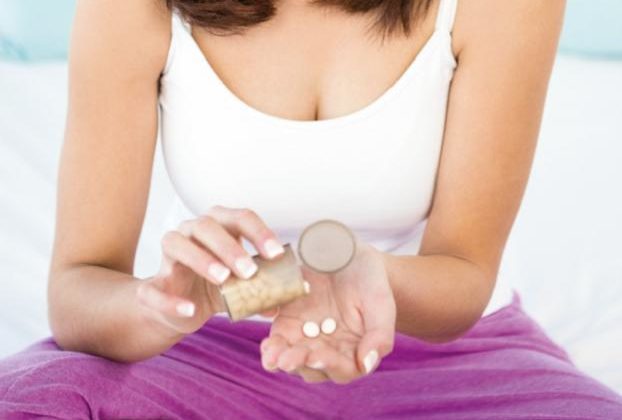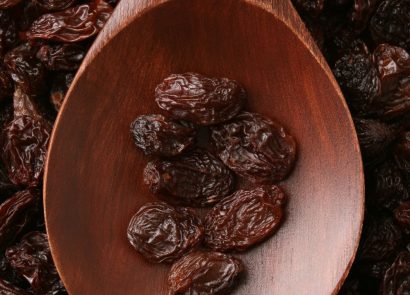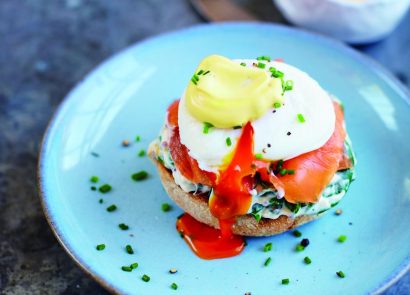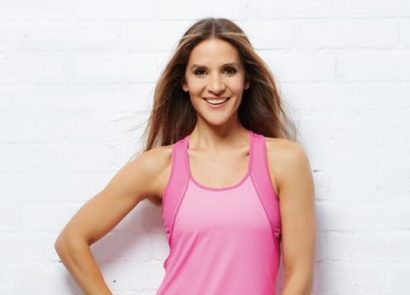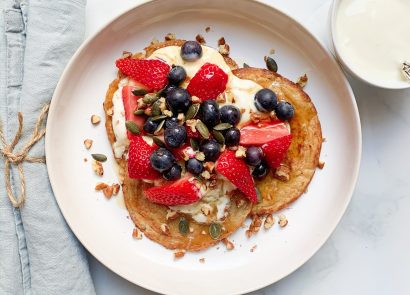Do you ever feel flummoxed by all the supplements on sale in your local health store? If you want to find more energy, feel younger, look thinner or be calmer, there’s a clever little pill out there that will claim to answer all your prayers. But which ones really work? And should we be taking them in the first place?
In an ideal world we’d be getting all our vitamins and minerals from our diet – but sometimes life gets in the way of a perfectly balanced menu, which is why taking a supplement really can come in handy. “Supplements are often necessary as modern life causes more stress on the body which leads to the need for extra support,” explains Rick Hay, director of nutrition at Healthista. com. “Sometimes diet is not enough, especially if we have acute conditions that can become chronic, and this is where supplements can help to relieve, treat and, often, even cure.” So read ahead for our pick of the best health buys to meet all your body’s needs!
For general health
Probiotics
An imbalance of the good bacteria in your digestive tract can lead to a range of pesky health issues such as bloating, IBS, flatulence and stomach cramping. While the best way to boost your gut health is to eat a broad variety of fruits, vegetables, pulses and fermented foods such as sauerkraut and kefir, a supplement can really help. “A good probiotic can help shift your resident bugs towards the friendlier types, such as lactobacillus and bifidobacteria, which can help with digestive health,” explains Dr Carrie Ruxton from the Health and Food Supplements Information Service (hsis.org).
Fish oils
The benefits of omega 3 oils, found in oily fish such as salmon and mackerel are legion, so it definitely makes sense to supplement if you’re not eating at least two portions of these healthy fish a week. Fish oils have been found to support general wellbeing, vision and brain function, as well as boosting heart health and stabilising moods. What’s more, they help to prevent wrinkles and give you plumped up glowing skin, so it’s a bit of a no-brainer really!
A multivitamin
This should be the foundation of your supplement regime to ensure you’re not missing out on any vital nutrients. Look for supplements that are tailored for women and, if possible, your age group. Also, ensure it includes trace minerals such as selenium and iodine (unless you’re on thyroxine) as well as choline and inositol. “I prefer using food-state versions as these provide the nutrients in a ready-to-use form, just as they would be found in food,” says top nutritionist Henrietta Norton (wildnutrition.com).
Vitamin D
One in three of us are deficient in this ‘sunshine vitamin’, which is naturally produced by the skin in response to sunlight. Vitamin D is already known to strengthen bones and muscles, and boost your immune function to stop you getting sick, but research also suggests that it can protect against respiratory and neurological problems. While it is found in sardines, liver and eggs, nutritionists advise everyone takes 10mcg daily supplements throughout the winter from October to April when we often don’t get enough natural sunlight.
For mood boosting
Magnesium
It is estimated that 70 percent of women in the western world are deficient in this crucial mineral. Known as ‘nature’s tranquiliser’, it is needed for more than 300 biochemical reactions in the body including the regulation of serotonin, a positive neurotransmitter in the brain that is essential for a stable mood. “Magnesium has a role in hormonal regulation and may also help blood sugar balance, which can help with mood issues,” says Rick. Symptoms of deficiency can include PMS, poor sleep, panic attacks and depression. A study published in the Public Library of Science Journal found that people who supplemented with magnesium for six weeks saw a significant improvement in their levels of depression and anxiety.
St Johns wort
If you’re feeling a bit blue, this gentle yet potent herb could put a smile back on your face. Several studies have found it to be as effective as conventional medicine when it comes to treating depressive symptoms. This is down to two compounds it contains called hypericin and hyperforin, which have been shown to boost the feel-good brain chemical serotonin. What’s more it can also help to boost the effect of other happiness-bolstering brain chemicals including noradrenaline and dopamine.
5HTP
Fish, turkey, chicken, cheese, beans, tofu and eggs contain a mood-boosting amino acid called tryptophan, which helps to raise levels of the happy hormone serotonin. However, you have to eat an awful lot of it to improve your mood, so it’s worth supplementing with 5HTP (or 5-hydroxytryptophan to go by its proper name), a more effective kind of tryptophan, which comes from a West African shrub called Griffonia simplicifolia. “Studies have shown that people who supplemented with 5HTP achieved a better decrease in depression than those using antidepressant drugs,” explains top nutritionist Patrick Holford (patrickholford.com). “It is very well absorbed, with about 70 percent being taken into the bloodstream and much of that crossing into the brain.”
For female health
Agnus castus
Do you suffer from mood swings every month? This is a great herb to take if you suffer from PMT or are going through the menopause, as it helps to balance your hormones naturally. “It works on the pituitary gland, which is the gland that sends the message down to the ovary to release hormones, and it can help to increase certain hormones if they are too low and decrease them if they are too high,” explains top women’s health expert Dr Marilyn Glenville (marilynglenville.com). This is particularly helpful when you are perimenopausal – this is the stage during the years leading up to the menopause, and it is often characterised by a time when your hormones can be fluctuating wildly.
Iron
“Most menstruating women need iron and particularly those who experience heavy blood loss (interestingly, iron deficiency also increases blood loss),” says Henrietta. However do get your iron stores checked (a good comprehensive test will include your ‘total iron binding capacity’ and ferritin levels) as taking iron unnecessarily can be toxic and reduce body stores of other important nutrients. Some good supplements use food sources such as beetroot powder, so that the body can use what it needs and easily eliminate what it does not.
Ashwagandha
“This is by far my favourite herb for women and I use it a lot in my clinical practice,” says Henrietta. Classified as an ‘adaptogen’ this nourishing plant has been used in ayurvedic medicine in India for thousands of years to treat all manner of health complaints. Among its many accolades, it has been shown to reduce anxiety and stress, as well as support the body’s response to hormonal changes. Being an adaptogen, it works with the body to find its own equilibrium and is the perfect all round health-booster.
For anti-ageing
Cordyceps
This super-strength fungi is just one of several medicinal mushrooms that have brilliant lifeenhancing properties. Found growing wild in the mountains of Asia, it has been used traditionally for almost 3000 years for its longevity boosting. According to the Life Extension Foundation (lef.org), it helps to enhance nutritional blood supply to the organs and extremities, specifically increasing blood supply to the brain and defending the heart against stress. It’s also rich in antioxidants that hold back cellular destruction, and demonstrates anti-inflammatory activity.
Turmeric
This yellow-coloured spice has been used for centuries across Asia not only to flavour curries but also as a traditional remedy to reduce inflammation. “Turmeric has many uses,” explains nutritional biochemist Jamie Christie at Lifeplan (lifeplan.co.uk). “It is a powerful antiinflammatory and can help stave off arthritis, reduce cholesterol, reduce depression and help with dementia.” The best curcumin supplements contain piperine, substantially increasing their effectiveness. Curcumin is also fat soluble, so it may be a good idea to take it with a fatty meal.
Co-enzyme Q10
Co-enzyme Q10 is a nutrient that’s crucial for keeping cells in our body buzzing with vital energy. It protects cells against free radical damage and helps to stimulate the immune system. Unfortunately, our natural reserves decrease as we get older and low levels have been linked to high blood pressure, heart attacks, periodontal disease and obesity, so taking a supplement might be your key to longevity. “Not only does it help to boost energy production at a mitochondrial level, it also shows promise in the area of cardiovascular health, which is one of the nations main causes of premature death,” says Rick.
3. Super supplements
Trend reports show a growing demand for health supplements. Here are three ingredients that have got the experts at Indigo Herbs talking…
Reishi mushroom
It’s the polysaccharides in reishi that can boost immunity, increase energy and promote a good mood. Spiritual adepts in Asia have prized the tonifying properties of this mushroom for thousands of years.
Red clover
The flavonoid phytonutrients in red clover mimic the hormone oestrogen, so studies have shown it to be effective during perimenopause at balancing oestrogen levels and reducing symptoms such as hot flushes.
Slippery elm
This powerful bark has a soothing action on the gastrointestinal tract and is recommended for irritable bowel, reflux and digestive disorders.









